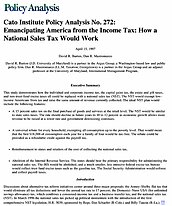- A 15 percent sales tax on the final purchase of goods and services at the retail level. The NST would be similar to state sales taxes. The rate should decline in future years to 10 to 12 percent as economic growth allows more revenue to be raised at a lower rate and government downsizing continues.
- A universal rebate for every household, exempting all consumption up to the poverty level. That would mean that the first $18,588 of consumption each year for a family of four would be tax-free. The rebate could be provided as a refundable credit against the payroll tax.
- Reimbursement to states and retailers of the cost of collecting the national sales tax.
- Abolition of the Internal Revenue Service. The states should bear the primary responsibility for administering the national sales tax. The IRS would be abolished, and a much smaller, less intrusive federal excise tax bureau would collect trust fund excise taxes such as the gasoline tax. The Social Security Administration would enforce and collect payroll taxes.
Emancipating America from the Income Tax: How a National Sales Tax Would Work
This study demonstrates how the individual and corporate income tax, the capital gains tax, the estate and gift taxes, and non-trust-fund excise taxes all could be replaced with a national sales tax (NST). The NST would exempt low-income Americans from tax and raise the same amount of revenue currently collected. The ideal NST plan would include the following features:
About the Authors
David R. Burton (J.D. University of Maryland) is a partner in the Argus Group, a Washington-based law and public policy firm. Dan R. Mastromarco (LL.M. Taxation, Georgetown) is a partner in the Argus Group and an adjunct professor at the University of Maryland, International Management Program.

This work is licensed under a Creative Commons Attribution-NonCommercial-ShareAlike 4.0 International License.
